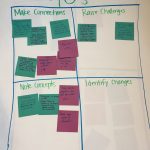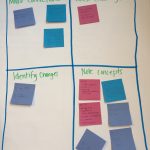A few weeks ago while attending a grad school class, my professor used an in-class reading strategy that ignited our discussion. This strategy was extremely helpful and allowed me to review my reading and strengthen my comprehension. Because I found this experience so helpful as a student, I decided to implement the strategy in my own class. The students were engaged with the text, and I was able to conduct an informal reading assessment as to whether or not they did the reading or what they comprehended.
For this strategy, you will need:
- Regular, square post-its
- Giant Post-Its or a hanout
- Markers or writing implements
To prepare for this activity, assign the students reading homework, and on your own (using the giant Post-its), draw a four square grid that has the following labels in each square: Make connections, identify changes, raise challenges, and note concepts. Below is an explanation of each C:
- Make Connections: In this space, students are encouraged to make connections between readings, their lives or experiences, other class discussions, etc.
- identify Changes: Students write changes that have happened in their mind since reading or learning about the concepts.
- Raise Challenges: This is an opportunity for students to raise questions about the concepts or challenge the author’s perspective with a statement or question.
- Note concepts: I found this section to be the easiest because it is facts or ideas straight from the book.
During class, the students use the regular sized Post-its to write down their ideas, noticings, highlights from the text to fill up the four categories. Encourage the students to use page numbers on each Post-it. The students work on this independently for several minutes. Side note: my students sit at tables of 3-4 people. For smaller classes, like my the grad school class I attend, have the students complete this independently and then have one Giant Post-it that they all add to.
Once the students have had some time to fill out their Post-its, they will put them on the giant Post-it. Then, as a table group, they can review and discuss all of their Post-its. When I did this activity, I had my students rotate around the room to see group’s ideas. We then discussed the ideas as a whole class.
If you’re interested in learning how to adapt this strategy for your class or discipline, then send me an email. Happy reading!


*Strategy adapted from Ritchart, R., Chruch, M., & Morrison, Kk. (2011). Making thinking visible: How to promote engagement, understanding, and independence for all learners. San Francisco, CA: Jossey-Bass.
